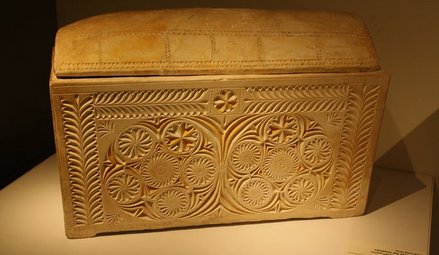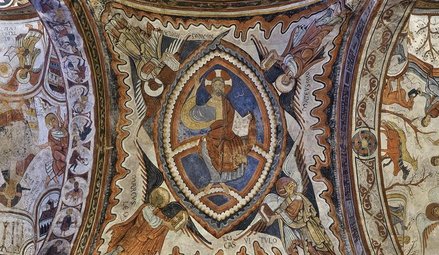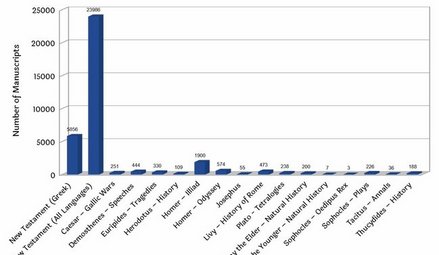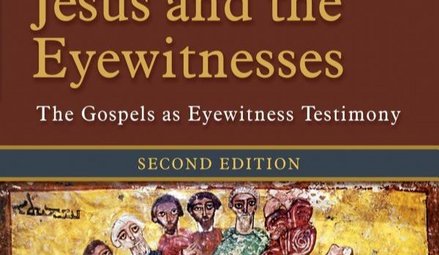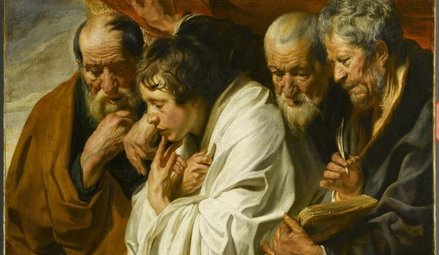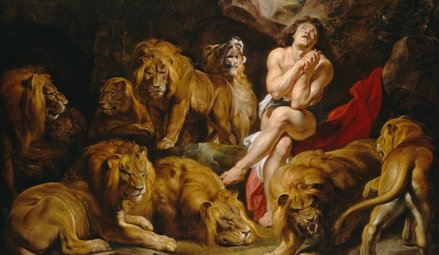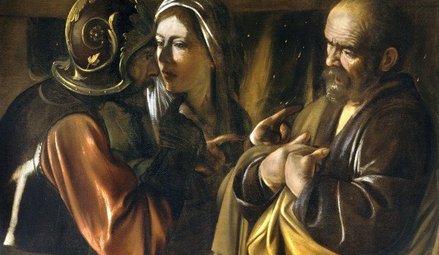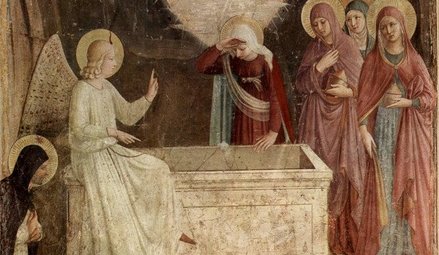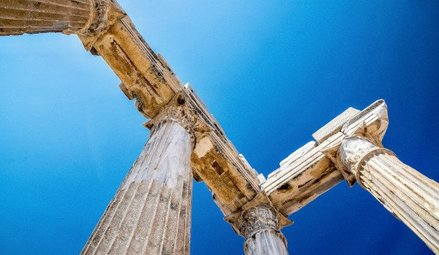- By theme
- Jesus
- The many proofs of Christ’s resurrection
- Saint Thomas Aquinas: God gave all the divine proofs we needed to believe
- The surpassing power of Christ's word
- Lewis’s trilemma: a proof of Jesus’s divinity
- God saves: the power of the holy name of Jesus
- Jesus spoke and acted as God's equal
- Jesus' divinity is actually implied in the Koran
- Jesus came at the perfect time of history
- Rabbinical sources testify to Jesus' miracles
- Mary
- The Church
- The Bible
- An enduring prophecy and a series of miraculous events preventing the reconstruction of the Temple
- The authors of the Gospels were either eyewitnesses or close contacts of those eyewitnesses
- Onomastics support the historical reliability of the Gospels
- The New Testament was not altered
- The New Testament is the best-attested manuscript of Antiquity
- The Gospels were written too early after the facts to be legends
- Archaeological finds confirm the reliability of the New Testament
- The criterion of embarrassment proves that the Gospels tell the truth
- The dissimilarity criterion strengthens the case for the historical reliability of the Gospels
- 84 details in Acts verified by historical and archaeological sources
- The unique prophecies that announced the Messiah
- The time of the coming of the Messiah was accurately prophesied
- The prophet Isaiah's ultra accurate description of the Messiah's sufferings
- Daniel's "Son of Man" is a portrait of Christ
- The Apostles
- Saint Peter, prince of the apostles
- Saint John the Apostle: an Evangelist and Theologian who deserves to be better known (d. 100)
- Saint Matthew, apostle, evangelist and martyr (d. 61)
- James the Just, “brother” of the Lord, apostle and martyr (d. 62 AD)
- Saint Matthias replaces Judas as an apostle (d. 63)
- The martyrs
- The protomartyr Saint Stephen (d. 31)
- Polycarp, bishop of Smyrna, disciple of John and martyr (d. 155)
- Saint Blandina and the Martyrs of Lyon: the fortitude of faith (177 AD)
- Saint Agatha stops a volcano from destroying the city of Catania (d. 251)
- Saint Lucy of Syracuse, virgin and martyr for Christ (d. 304)
- Thomas More: “The king’s good servant, but God’s first”
- The martyrdom of Paul Miki and his companions (d. 1597)
- The martyrs of Angers and Avrillé (1794)
- The Martyrs of Compiègne (1794)
- The Vietnamese martyrs Father Andrew Dung-Lac and his 116 companions (17th-19th centuries)
- He braved torture to atone for his apostasy (d. 1818)
- Blaise Marmoiton: the epic journey of a missionary to New Caledonia (d. 1847)
- José Luis Sanchez del Rio, martyred at age 14 for Christ the King (d. 1928)
- Saint Maximilian Kolbe, Knight of the Immaculate (d. 1941)
- The monks
- The Desert Fathers (3rd century)
- Saint Anthony of the Desert, a father of monasticism (d. 356)
- Saint Benedict, father of Western monasticism (d. 550)
- Saint Bruno the Carthusian (d.1101): the miracle of a hidden life
- Blessed Angelo Agostini Mazzinghi: the Carmelite with flowers pouring from his mouth (d. 1438)
- Monk Abel of Valaam's accurate prophecies about Russia (d. 1841)
- The more than 33,000 miracles of Saint Charbel Maklouf (d. 1898)
- Saint Pio of Pietrelcina (d. 1968): How God worked wonders through "a poor brother who prays"
- The surprising death of Father Emmanuel de Floris (d. 1992)
- The prophecies of Saint Paisios of Mount Athos (d. 1994)
- The saints
- Saints Anne and Joachim, parents of the Virgin Mary (19 BC)
- Saint Nazarius, apostle and martyr (d. 68 or 70)
- Ignatius of Antioch: successor of the apostles and witness to the Gospel (d. 117)
- Saint Gregory the Miracle-Worker (d. 270)
- Saint Martin of Tours: patron saint of France, father of monasticism in Gaul, and the first great leader of Western monasticism (d. 397)
- Saint Lupus, the bishop who saved his city from the Huns (d. 623)
- Saint Dominic of Guzman (d.1221): an athlete of the faith
- Saint Francis, the poor man of Assisi (d. 1226)
- Saint Anthony of Padua: "everyone’s saint"
- Saint Rose of Viterbo or How prayer can transform the world (d. 1252)
- Saint Simon Stock receives the scapular of Mount Carmel from the hands of the Virgin Mary
- The unusual boat of Saint Basil of Ryazan
- Saint Agnes of Montepulciano's complete God-confidence (d. 1317)
- The extraordinary conversion of Michelina of Pesaro
- Saint Peter Thomas (d. 1366): a steadfast trust in the Virgin Mary
- Saint Rita of Cascia: hoping against all hope
- Saint Catherine of Genoa and the Fire of God's love (d. 1510)
- Saint Anthony Mary Zaccaria, physician of bodies and souls (d. 1539)
- Saint Ignatius of Loyola (d. 1556): "For the greater glory of God"
- Brother Alphonsus Rodríguez, SJ: the "holy porter" (d. 1617)
- Martin de Porres returns to speed up his beatification (d. 1639)
- Virginia Centurione Bracelli: When God is the only goal, all difficulties are overcome (d.1651)
- Saint Marie of the Incarnation, "the Teresa of New France" (d.1672)
- St. Francis di Girolamo's gift of reading hearts and souls (d. 1716)
- Rosa Venerini: moving in the ocean of the Will of God (d. 1728)
- Seraphim of Sarov (1759-1833): the purpose of the Christian life is to acquire the Holy Spirit
- Camille de Soyécourt, filled with divine fortitude (d. 1849)
- Bernadette Soubirous, the shepherdess who saw the Virgin Mary (1858)
- Saint John Vianney (d. 1859): the global fame of a humble village priest
- Gabriel of Our Lady of Sorrows, the "Gardener of the Blessed Virgin" (d. 1862)
- Father Gerin, the holy priest of Grenoble (1863)
- Blessed Francisco Palau y Quer: a lover of the Church (d. 1872)
- Saints Louis and Zelie Martin, the parents of Saint Therese of Lisieux (d. 1894 and 1877)
- The supernatural maturity of Francisco Marto, “contemplative consoler of God” (d. 1919)
- Saint Faustina, apostle of the Divine Mercy (d. 1938)
- Brother Marcel Van (d.19659): a "star has risen in the East"
- Doctors
- The mystics
- Lutgardis of Tongeren and the devotion to the Sacred Heart
- Saint Angela of Foligno (d. 1309) and "Lady Poverty"
- Saint John of the Cross: mystic, reformer, poet, and universal psychologist (+1591)
- Blessed Anne of Jesus: a Carmelite nun with mystical gifts (d.1621)
- Catherine Daniélou: a mystical bride of Christ in Brittany
- Saint Margaret Mary sees the "Heart that so loved mankind"
- Mother Yvonne-Aimée of Jesus' predictions concerning the Second World War (1922)
- Sister Josefa Menendez, apostle of divine mercy (d. 1923)
- Edith Royer (d. 1924) and the Sacred Heart Basilica of Montmartre
- Rozalia Celak, a mystic with a very special mission (d. 1944)
- Visionaries
- Saint Perpetua delivers her brother from Purgatory (203)
- María de Jesús de Ágreda, abbess and friend of the King of Spain
- Discovery of the Virgin Mary's house in Ephesus (1891)
- Sister Benigna Consolata: the "Little Secretary of Merciful Love" (d. 1916)
- Maria Valtorta's visions match data from the Israel Meteorological Service (1943)
- Berthe Petit's prophecies about the two world wars (d. 1943)
- Maria Valtorta saw only one pyramid at Giza in her visions... and she was right! (1944)
- The 700 extraordinary visions of the Gospel received by Maria Valtorta (d. 1961)
- The amazing geological accuracy of Maria Valtorta's writings (d. 1961)
- Maria Valtorta's astronomic observations consistent with her dating system
- Discovery of an ancient princely house in Jerusalem, previously revealed to a mystic (d. 1961)
- The popes
- The great witnesses of the faith
- Saint Augustine's conversion: "Why not this very hour make an end to my uncleanness?" (386)
- Thomas Cajetan (d. 1534): a life in service of the truth
- Madame Acarie, "the servant of the servants of God" (d. 1618)
- Blaise Pascal (d.1662): Biblical prophecies are evidence
- Madame Élisabeth and the sweet smell of virtue (d. 1794)
- Jacinta, 10, offers her suffering to save souls from hell (d. 1920)
- Father Jean-Édouard Lamy: "another Curé of Ars" (d. 1931)
- Christian civilisation
- The depth of Christian spirituality
- John of the Cross' Path to perfect union with God based on his own experience
- The dogma of the Trinity: an increasingly better understood truth
- The incoherent arguments against Christianity
- The "New Pentecost": modern day, spectacular outpouring of the Holy Spirit
- The Christian faith explains the diversity of religions
- Cardinal Pierre de Bérulle (d.1629) on the mystery of the Incarnation
- Christ's interventions in history
- Marian apparitions and interventions
- The Life-giving Font of Constantinople
- Our Lady of Virtues saves the city of Rennes in Bretagne (1357)
- Mary stops the plague epidemic at Mount Berico (1426)
- Our Lady of Miracles heals a paralytic in Saronno (1460)
- Cotignac: the first apparitions of the Modern Era (1519)
- Savona: supernatural origin of the devotion to Our Lady of Mercy (1536)
- The Virgin Mary delivers besieged Christians in Cusco, Peru
- The victory of Lepanto and the feast of Our Lady of the Rosary (1571)
- The apparitions to Brother Fiacre (1637)
- The “aldermen's vow”, or the Marian devotion of the people of Lyon (1643)
- Our Lady of Nazareth in Plancoët, Brittany (1644)
- Our Lady of Laghet (1652)
- Saint Joseph’s apparitions in Cotignac, France (1660)
- Heaven confides in a shepherdess of Le Laus (1664-1718)
- Zeitoun, a two-year miracle (1968-1970)
- The Holy Name of Mary and the major victory of Vienna (1683)
- Heaven and earth meet in Colombia: the Las Lajas shrine (1754)
- The five Marian apparitions that traced an "M" over France, and its new pilgrimage route
- A series of Marian apparitions and prophetic messages in Ukraine since the 19th century (1806)
- "Consecrate your parish to the Immaculate Heart of Mary" (1836)
- At La Salette, Mary wept in front of the shepherds (1846)
- Our Lady of Champion, Wisconsin: the first and only approved apparition of Mary in the US (1859)
- Gietrzwald apparitions: heavenly help to a persecuted minority
- The silent apparition of Knock Mhuire in Ireland (1879)
- Mary "Abandoned Mother" appears in a working-class district of Lyon, France (1882)
- The thirty-three apparitions of the Virgin Mary in Beauraing (1932)
- "Our Lady of the Poor" appears eight times in Banneux (1933)
- Fontanelle-Montichiari apparitions of Our Lady "Rosa Mystica" (1947)
- Mary responds to the Vows of the Polish Nation (1956)
- Zeitoun apparitions
- The Virgin Mary comes to France's rescue by appearing at L'Ile Bouchard (1947)
- Maria Esperanza Bianchini and Mary, Mary, Reconciler of Peoples and Nations (1976)
- Luz Amparo and the El Escorial apparitions
- The extraordinary apparitions of Medjugorje and their worldwide impact
- The Virgin Mary prophesied the 1994 Rwandan genocide (1981)
- Our Lady of Soufanieh's apparition and messages to Myrna Nazzour (1982)
- The Virgin Mary heals a teenager, then appears to him dozens of times (1986)
- Seuca, Romania: apparitions and pleas of the Virgin Mary, "Queen of Light" (1995)
- Angels and their manifestations
- Mont Saint-Michel: Heaven watching over France
- Angels give a supernatural belt to the chaste Thomas Aquinas (1243)
- The constant presence of demons and angels in the life of St Frances of Rome (d. 1440)
- Mother Yvonne-Aimée escapes from prison with the help of an angel (1943)
- Saved by Angels: The Miracle on Highway 6 (2008)
- Exorcisms in the name of Christ
- A wave of charity unique in the world
- Saint Peter Nolasco: a life dedicated to ransoming enslaved Christians (d. 1245)
- Saint Angela Merici: Christ came to serve, not to be served (d. 1540)
- Saint John of God: a life dedicated to the care of the poor, sick and those with mental disorders (d. 1550)
- Saint Camillus de Lellis, reformer of hospital care (c. 1560)
- Blessed Alix Le Clerc, encouraged by the Virgin Mary to found schools (d. 1622)
- Saint Vincent de Paul (d. 1660), apostle of charity
- Marguerite Bourgeoys, Montreal's first teacher (d. 1700)
- Frédéric Ozanam, inventor of the Church's social doctrine (d. 1853)
- Damian of Molokai: a leper for Christ (d. 1889)
- Pier Giorgio Frassati (d.1925): heroic charity
- Saint Dulce of the Poor, the Good Angel of Bahia (d. 1992)
- Mother Teresa of Calcutta (d. 1997): an unshakeable faith
- Heidi Baker: Bringing God's love to the poor and forgotten of the world
- Amazing miracles
- The miracle of liquefaction of the blood of St. Januarius (d. 431)
- The miracles of Saint Anthony of Padua (d. 1231)
- Saint Pius V and the miracle of the Crucifix (1565)
- Saint Philip Neri calls a teenager back to life (1583)
- The resurrection of Jérôme Genin (1623)
- Saint Francis de Sales brings back to life a victim of drowning (1623)
- Saint John Bosco and the promise kept beyond the grave (1839)
- The day the sun danced at Fatima (1917)
- Pius XII and the miracle of the sun at the Vatican (1950)
- When Blessed Charles de Foucauld saved a young carpenter named Charle (2016)
- Reinhard Bonnke: 89 million conversions (d. 2019)
- Miraculous cures
- The royal touch: the divine thaumaturgic gift granted to French and English monarchs (11th-19th centuries)
- With 7,500 cases of unexplained cures, Lourdes is unique in the world (1858-today)
- Our Lady at Pellevoisin: "I am all merciful" (1876)
- Mariam, the "little thing of Jesus": a saint from East to West (d.1878)
- Gemma Galgani: healed to atone for sinners' faults (d. 1903)
- The miraculous cure of Blessed Maria Giuseppina Catanea
- The extraordinary healing of Alice Benlian in the Church of the Holy Cross in Damascus (1983)
- The approved miracle for the canonization of Juan Diego Cuauhtlatoatzin (1990)
- Healed by St Charbel Makhlouf, her scars bleed each month for the benefit of unbelievers (1993)
- The miracle that led to Brother André's canonisation (1999)
- Bruce Van Natta's intestinal regrowth: an irrefutable miracle (2007)
- He had “zero” chance of living: a baby's miraculous recovery (2015)
- Manouchak, operated on by Saint Charbel (2016)
- How Maya was cured from cancer at Saint Charbel's tomb (2018)
- Preserved bodies of the saints
- Dying in the odour of sanctity
- The body of Saint Cecilia found incorrupt (d. 230)
- Stanislaus Kostka's burning love for God (d. 1568)
- Blessed Antonio Franco, bishop and defender of the poor (d. 1626)
- The incorrupt body of Marie-Louise Nerbollier, the visionary from Diémoz (d. 1910)
- The great exhumation of Saint Charbel (1950)
- Bilocations
- Inedias
- Levitations
- Lacrimations and miraculous images
- Saint Juan Diego's tilma (1531)
- The Rue du Bac apparitions of the Virgin Mary to St. Catherine Labouré (Paris, 1830)
- Mary weeps in Syracuse (1953)
- Teresa Musco (d.1976): salvation through the Cross
- Soufanieh: A flow of oil from an image of the Virgin Mary, and oozing of oil from the face and hands of Myrna Nazzour (1982)
- The Saidnaya icon exudes a wonderful fragrance (1988)
- Our Lady weeps in a bishop's hands (1995)
- Stigmates
- The venerable Lukarda of Oberweimar shares her spiritual riches with her convent (d. 1309)
- Blessed Maria Grazia Tarallo, mystic and stigmatist (d. 1912)
- Saint Padre Pio: crucified by Love (1918)
- Elena Aiello: "a Eucharistic soul"
- A Holy Triduum with a Syrian mystic, witnessing the sufferings of Christ (1987)
- A Holy Thursday in Soufanieh (2004)
- Eucharistic miracles
- Lanciano: the first and possibly the greatest Eucharistic miracle (750)
- A host came to her: 11-year-old Imelda received Communion and died in ecstasy (1333)
- Faverney's hosts miraculously saved from fire
- A tsunami recedes before the Blessed Sacrament (1906)
- Buenos Aires miraculous host sent to forensic lab, found to be heart muscle (1996)
- Relics
- The Veil of Veronica, known as the Manoppello Image
- For centuries, the Shroud of Turin was the only negative image in the world
- The Holy Tunic of Argenteuil's fascinating history
- Saint Louis (d. 1270) and the relics of the Passion
- The miraculous rescue of the Shroud of Turin (1997)
- A comparative study of the blood present in Christ's relics
- Jews discover the Messiah
- Francis Xavier Samson Libermann, Jewish convert to Catholicism (1824)
- Our Lady of the Miraculous Medal and the conversion of Alphonse Ratisbonne (1842)
- Max Jacob: a liberal gay Jewish artist converts to Catholicism (1909)
- Edith Stein - Saint Benedicta of the Cross: "A daughter of Israel who, during the Nazi persecutions, remained united with faith and love to the Crucified Lord, Jesus Christ, as a Catholic, and to her people as a Jew"
- Patrick Elcabache: a Jew discovers the Messiah after his mother is miraculously cured in the name of Jesus
- Cardinal Aron Jean-Marie Lustiger (d. 2007): Chosen by God
- Muslim conversions
- Buddhist conversions
- Atheist conversions
- The conversion of an executioner during the Terror (1830)
- God woos a poet's heart: the story of Paul Claudel's conversion (1886)
- Dazzled by God: Madeleine Delbrêl's story (1924)
- C.S. Lewis, the reluctant convert (1931)
- The day André Frossard met Christ in Paris (1935)
- MC Solaar's rapper converts after experiencing Jesus' pains on the cross
- Father Sébastien Brière, converted at Medjugorje (2003)
- Franca Sozzani, the "Pope of fashion" who wanted to meet the Pope (2016)
- Nelly Gillant: from Reiki Master to Disciple of Christ (2018)
- Testimonies of encounters with Christ
- Near-death experiences (NDEs) confirm Catholic doctrine on the Four Last Things
- The NDE of Saint Christina the Astonishing, a source of conversion to Christ (1170)
- Jesus audibly calls Alphonsus Liguori to follow him (1723)
- Blessed Dina Bélanger (d. 1929): loving God and letting Jesus and Mary do their job
- Gabrielle Bossis: He and I
- André Levet's conversion in prison
- Journey between heaven and hell: a "near-death experience" (1971)
- Alicja Lenczewska: conversations with Jesus (1985)
- Vassula Ryden and the "True Life in God" (1985)
- Nahed Mahmoud Metwalli: from persecutor to persecuted (1987)
- The Bible verse that converted a young Algerian named Elie (2000)
- Invited to the celestial court: the story of Chantal (2017)
- Providential stories
- The superhuman intuition of Saint Pachomius the Great
- Germanus of Auxerre's prophecy about Saint Genevieve's future mission, and protection of the young woman (446)
- Seven golden stars reveal the future location of the Grande Chartreuse Monastery (1132)
- The supernatural reconciliation of the Duke of Aquitaine (1134)
- Saint Zita and the miracle of the cloak (13th c.)
- Joan of Arc: "the most beautiful story in the world"
- John of Capistrano saves the Church and Europe (1456)
- A celestial music comforts Elisabetta Picenardi on her deathbed (d. 1468)
- Gury of Kazan: freed from his prison by a "great light" (1520)
- The strange adventure of Yves Nicolazic (1623)
- Julien Maunoir miraculously learns Breton (1626)
- Pierre de Keriolet: with Mary, one cannot be lost (1636)
- How Korea evangelized itself (18th century)
- A hundred years before it happened, Saint Andrew Bobola predicted that Poland would be back on the map (1819)
- The prophetic poem about John Paul II (1840)
- Don Bosco's angel dog: Grigio (1854)
- Thérèse of Lisieux saved countless soldiers during the Great War
- Lost for over a century, a Russian icon reappears (1930)
- In 1947, a rosary crusade liberated Austria from the Soviets (1946-1955)
- The discovery of the tomb of Saint Peter in Rome (1949)
- He should have died of hypothermia in Soviet jails (1972)
- God protects a secret agent (1975)
- Flowing lava stops at church doors (1977)
- A protective hand saved John Paul II and led to happy consequences (1981)
- Mary Undoer of Knots: Pope Francis' gift to the world (1986)
- Edmond Fricoteaux's providential discovery of the statue of Our Lady of France (1988)
- The Virgin Mary frees a Vietnamese bishop from prison (1988)
- The miracles of Saint Juliana of Nicomedia (1994)
- Global launch of "Pilgrim Virgins" was made possible by God's Providence (1996)
- The providential finding of the Mary of Nazareth International Center's future site (2000)
- Syrian Monastery shielded from danger multiple times (2011-2020)
- Jesus
- Who are we?
- Make a donation
TOUTES LES RAISONS DE CROIRE
La Bible
n°71
Babylonia
6th century BC
Daniel's "Son of Man" is a portrait of Christ
The prophet Daniel left his mark on Sacred Scriptures with his two astonishing prophecies: one indicating the date of the Messiah's coming (the "Seventy Weeks" and "4th Kingdom" after Nebuchadnezzar prophecy), the other about the mysterious figure and coming of a "son of man" (Dan.7:13; 8:15), who will walk "on the clouds of Heaven" (Dan 7:13), whose power make him God's equal, and whose "kingdom" "will have no end" (Dan 7:14). This kingdom can only be in Heaven, since nothing on earth, even in our universe is ever-lasting. With these new, porpentous prophetic announcements, the expected coming of a Messiah became more precise in the last centuries of Old Testament revelation. Daniel's prophetic and grandiose perspectives perfectly correspond to the divine plan of the redemptive Incarnation of Jesus Christ, the Son of God.
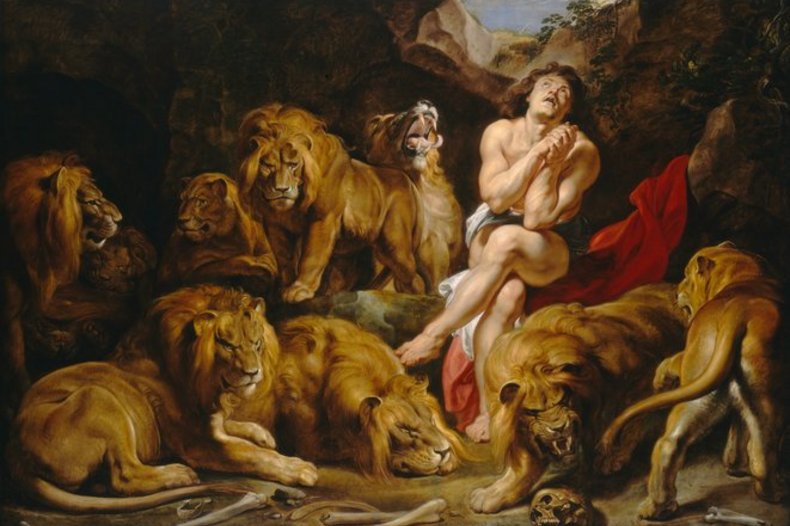
Daniel in the lion's den, Rubens, 1614-1616, National Gallery of Art, Washingotn / © CC0/wikimedia
Les raisons d'y croire :
- Not one person in history ever claimed to be the biblical "Son of Man" except Jesus, who makes reference to this mysterious figure of Daniel, from the very beginning of his public life when he addresses Nathanael (Jn 1:51), and especially at the end of his public life, when he says that his future glorious coming "on the clouds of heaven"(Mt 24:30; 26:64; Mk 13:26; 14:62) will precede the coming of his Kingdom (Mt 16:28; 24:27-44; Lk 17:22-30), his final judgement of humanity (Jn 5:27), and the "manifestation of his glory" (Mt 25:31; Mk 13:26; Lk 21:27-36).
- Jesus refers to himself by the same expression of "Son of Man", consistently throughout the Gospel, and more so than any other Old Testament term referring to the Messiah (Mt 8:20; 9:6; 10:23; 11:19; 12:8; 12:32; 12:40; 13:37; 13:41; 16:13-28; 17:9-22 ; 18:11; 19:28; 20:18 ; 20:28 ; 26:2-45; Mk 2:10-28; 8:31-38; 9:9-31 ; 10:33-45 ; 14:21-41 ; Lk 5:24; 6:5; 6:22; 7:34; 9:22-58 ; 11:30 ; 12:8-1012:40 ; 18:8; 18:31; 19:10; 22:22; 22:48 ; 24:7 ; Jn 3:13-14; 6:27-62 ; 8:28 ; 9:35 ; 12:23; 12:34 ; 13:31).
- It is this very title, used with explicit reference to the great prophecy of Daniel, that at the critical moment of his Passion, when his fate was hanging in the balance, Jesus used in his answer to the high priest - a shocking answer that brought his condemnation: "You said it yourself, and in truth I tell you that you will see the Son of Man seated at the right hand of the Power and coming on the clouds of Heaven" (Mt 26:64; Mk 14:62; Lk 22:69).
- The protomartyr St. Stephen had exactly this vision after defending his faith before the Sanhedrin, moments before he died by stoning: "Behold, I see the heavens opened and the Son of Man standing at the right hand of God" (Acts 7:56).
- It is therefore absolutely certain that Jesus identified completely with Daniel's prophecy announcing the coming on earth of a divine being, called "the Son of Man", who would reign eternally.
- In the end, Daniel's prophecy is strikingly consistent with the entire Gospel and the revelation of Jesus, to whom will ultimately be attributed all the titles that were explicitly reserved for God in the Old Testament.
Synthèse :
Daniel's vision is really striking: it emphasizes the Messiah's divinity and eternal reign more explicitly than ever before in Sacred History: "As the visions during the night continued, I saw coming with the clouds of heaven One like a son of man. When he reached the Ancient of Days and was presented before him, He received dominion, splendor, and kingship; all nations, peoples and tongues will serve him. His dominion is an everlasting dominion that shall not pass away, his kingship, one that shall not be destroyed" (Dan 7:14).
Contrary to a certain interpretation by some Jews, this kingdom or kingship must refer to an eternal reign in Heaven with the God of the ages, because nothing on earth is eternal.
The same notion is present in some other biblical prophecies, for example in the famous refrain of the psalmist, "His Mercy endures forever"(Ps 106; 107; 117; 135); in the verse "Your reign is a reign for all ages, your dominion for all generations" (Ps 145:13); in the verse "Open ye the everlasting gates: Let the King of glory enter! Who is this King of glory? He is the Lord, strong and mighty" (Ps 24:7); in this stunning vision: "Above the firmament over their heads was the likeness of a throne that looked like sapphire; and upon this likeness of a throne was seated, up above, a figure that looked like a human being" (Ezek 1:26); and finally in Samuel's promise to David: "Your house and your kingdom are firm forever before me; your throne shall be firmly established forever."(2 Sa 7:16). But Daniel's words are much more specific and clearly refer to the Messiah.
It is true that the old Testament contains many other promises evoking an apparent "earthly" triumph of the Messiah, for example:
-"May he rule from sea to sea, from the river to the ends of the earth" (Ps 72:8).
-"Nomore evil or violence will be done on all my holy mountain, for the knowledge of the Lord will fill the earth as the waters cover the sea "(Is 11:9).
-"They will forge ploughshares from their swords and pruning hooks from their spears. People shall not lift up sword against people, nor shall they train for way war any more"(Is 2:4).
-"May they fear you with the sun, and before the moon, through all generations" (Ps 72:5).
-"That abundance may flourish in his days, great bounty, till the moon be no more." (Ps 72:7).
-"Everyone, from least to greatest, shall know me" (Jer 31:34).
-"With an iron rod you will shepherd them, like a potter’s vessel you will shatter them" (Ps 2:9).
Yet Daniel's contribution is really valuable in that it not only provides new key elements to understand the Messiah's identity and mission, but also completes the full messianic picture.
In the end, the Jewish tradition obviously accepted and expected the idea of an "eternal life" (2 Mc 7:9), of an "infinite age" (Ps 21:5), and of a future triumph of the elect in Heaven with God (Salvation Is from the Jews: The Role of Judaism in Salvation History by Roy Schoeman) but somehow it was keen to retain the above prophecies, and many others of the same vein, which announce an earthly, still unfulfilled triumph of the Messiah.
And in fact, because the above prophecies about the Messiah's earthly triumph have not yet been fulfilled, this narrow expectation is the greatest obstacle to the Jews' recognition of Jesus as Messiah, today as in the past (Cf The Disputation of Barcelona, July 20–24, 1263).
In the correct, complete and Christian vision, we must therefore make a clear distinction between, on the one hand, what concerns the eternal triumph promised to Christ in the Kingdom of God, in particular according to the prophecies of Daniel, and on the other hand, everything that concerns his forthcoming glorious coming to earth, which is also promised and not yet fulfilled, as Saint Peter himself explained to the Jews just after Pentecost:
"Repent therefore and be converted, that your sins may be blotted out, so that the Lord may bring about the time of respite. Then he will send the Christ who was destined for you, Jesus, whom heaven must keep until thetime of the universal restoration of which God spoke by the mouth of his holy prophets from of old" (Acts 3:19-21).
This "universal restoration of which God has spoken by the mouth of his holy prophets from of old" has yet to come on earth, and so it has not yet been fulfilled, according to the very admission of the prince of the apostles.
We also we await and proclaim this "glorious manifestation of Our Lord Jesus Christ" (Dei Verbum I,4) when we recite in the Creed: "He will come again in glory." We pray this same petition in the Lord's Prayer (the "Our Father"): "Thy kingdom come, thy will be done on earth as it is in heaven" (Mt 6:10). The angels themselves reiterated this promise to the disciples after the Ascension: "This Jesus who has been taken up from you into heaven will return in the same way as you have seen him going into heaven" (Acts 1:11).
Finally, the New Testament ends with these words: "The one who gives this testimony says, 'Yes, I am coming soon.' Amen! Come, Lord Jesus!" (Rev 22:20).
"Christ, offered once to take away the sins of many, will appear a second time, not to take away sin but to bring salvation to those who eagerly await him" (Heb 9:28).
What exactly is the divine plan to bring about the glorious second coming of Christ? It consists in this: the Church, who is the Body of Christ, must "follow the Lamb" (Rev 14:4); She must "follow her Lord in his death and resurrection "(CCC 677) and, in a similar way, go through where he has gone.
- The great apostasy of the world (Mt 24:12; Lk 18:8; 2 Thess 2:3) will be followed by a "great tribulation"of the Church (Mt 24:21), a "final trial" (CCC 675) and the coming of the Antichrist (2 Thess 2:3-4; 1 Jn 4,3) "who will concentrate all heresies" (Saint Irenaeus, Against Heresies V, 25,1) and who will be worshipped (Rev 13:8), for a time that corresponds to the Passion.
- The glorious coming of Christ (1 Tim 6:14; 2 Tim 4:1-8; Titus 2:13) who will bring down the godless with the breath of his mouth" (2 Thess 2:8) in order to save his chosen ones (Mt 24:22; Mk 13:20; Heb 9:28) and will bring down his Bride from heaven (cf. CCC 677 and Rev 21:2-4) to "establish his kingdom" (Rev 19:6), corresponds to the Resurrection of Jesus.
- A "reign of God on earth ", identified in Scripture as lasting a millennium (a symbolic period of 1,000 years - cf. Rev 20:2-3), in other words "a time of peace given to the world" (cf. Fatima), which will parallel the 40 days of the glorified Christ's presence on earth.
- The "end of the world" (1 Thess 4:17; Rev 20:9-10), which will correspond to Christ's ascension to God.
- The "Last Judgement" (Dan 7:10; Joel 3-4; Ml 3,19; Mt 3:12; Mt 25:40; Rev 20:12), which marks the beginning of God's eternal reign.
These are the events we are awaiting, and preparing for with the "New Advent" evoked by John Paul II. "But when the Son of Man comes, will he find faith on earth?" (Lk 18:8).
The complete sequence which emerges from these prophecies and many others, is that the Messiah will come at the appointed time, will be a divine being, will inaugurate an eternal reign in Heaven, but will also intervene on earth a second time in history on behalf of the elect, to put an end to the prevailing apostasy and iniquity, and create a new order.
Finally, we should mention another of Daniel's prophecies connected to the prophecy of the Seventy Weeks, which speaks of "a Messiah who will be cut off" and then of "the destruction of the city and the Holy Place" with " wars and devastations" (Dan 9:26). This description fits in well with the sequence of events that started with the death of Christ in 30 A.D., followed by the destruction of Jerusalem and its Temple 40 years later, in 70 A.D. , and the final near destruction or enslavement of the Jewish population after the Third Roman-Jewish War in 135 A.D., after a series of terrible wars against the Romans ("in Hadrian's reign, when Jerusalem was completely destroyed and the Jewish nation was massacred in large groups at a time, with the result that they were even expelled from the borders of Judaea." Jerome (Commentary on Daniel III, ix, 24).
Olivier Bonnassies
Au-delà des raisons d'y croire :
The return of Christ in glory is something that Christians must believe and prepare for. It is part of the Christian creed, and offers the hope of a new earth and a new Heaven.
Aller plus loin :
Jerome's Commentary on Daniel, translated by Dr. Gleason L. Archer Jr. (Wipf and Stock, January 8, 2009)










